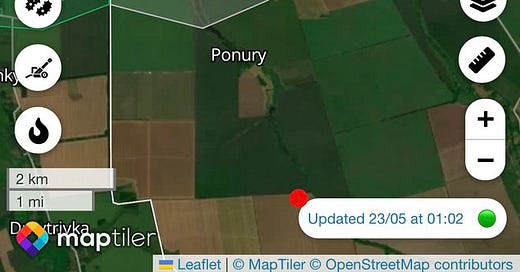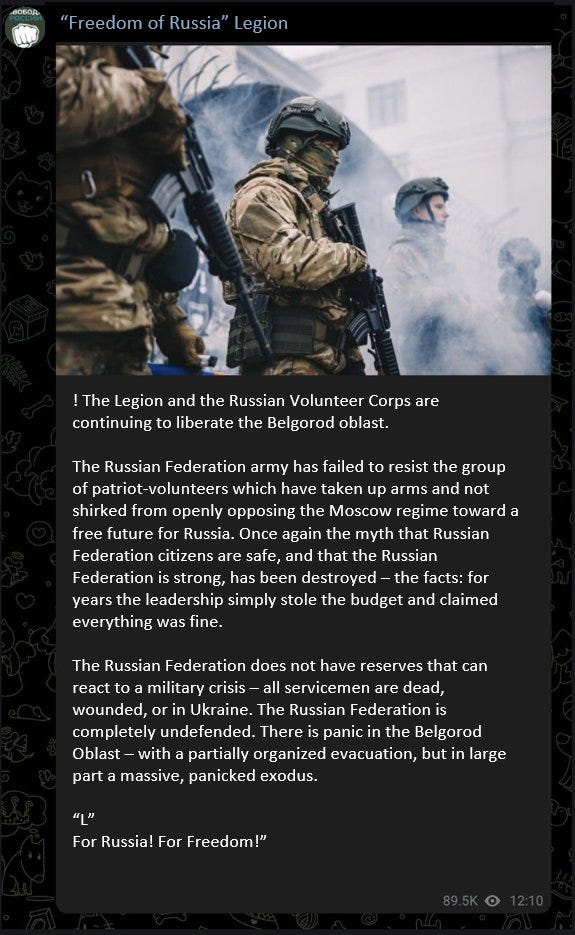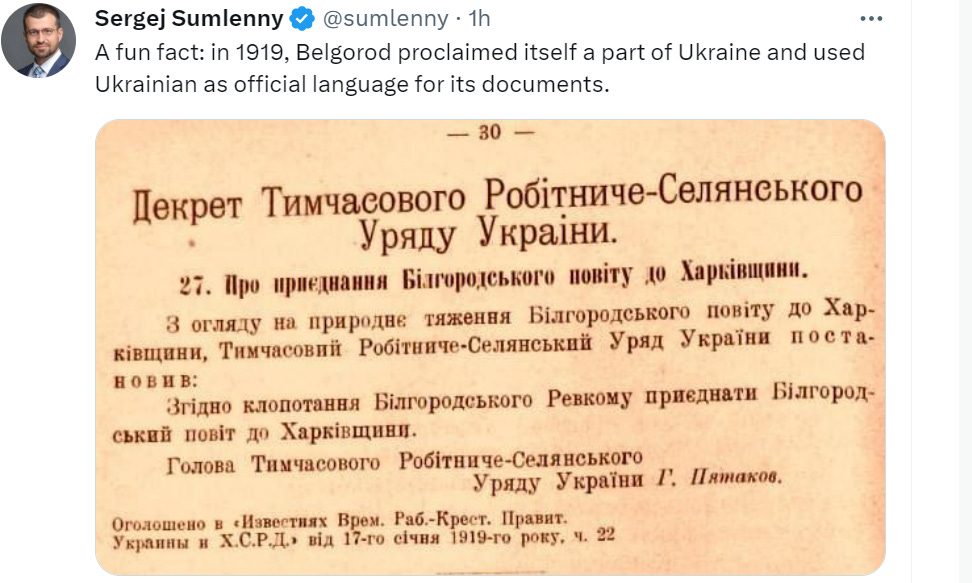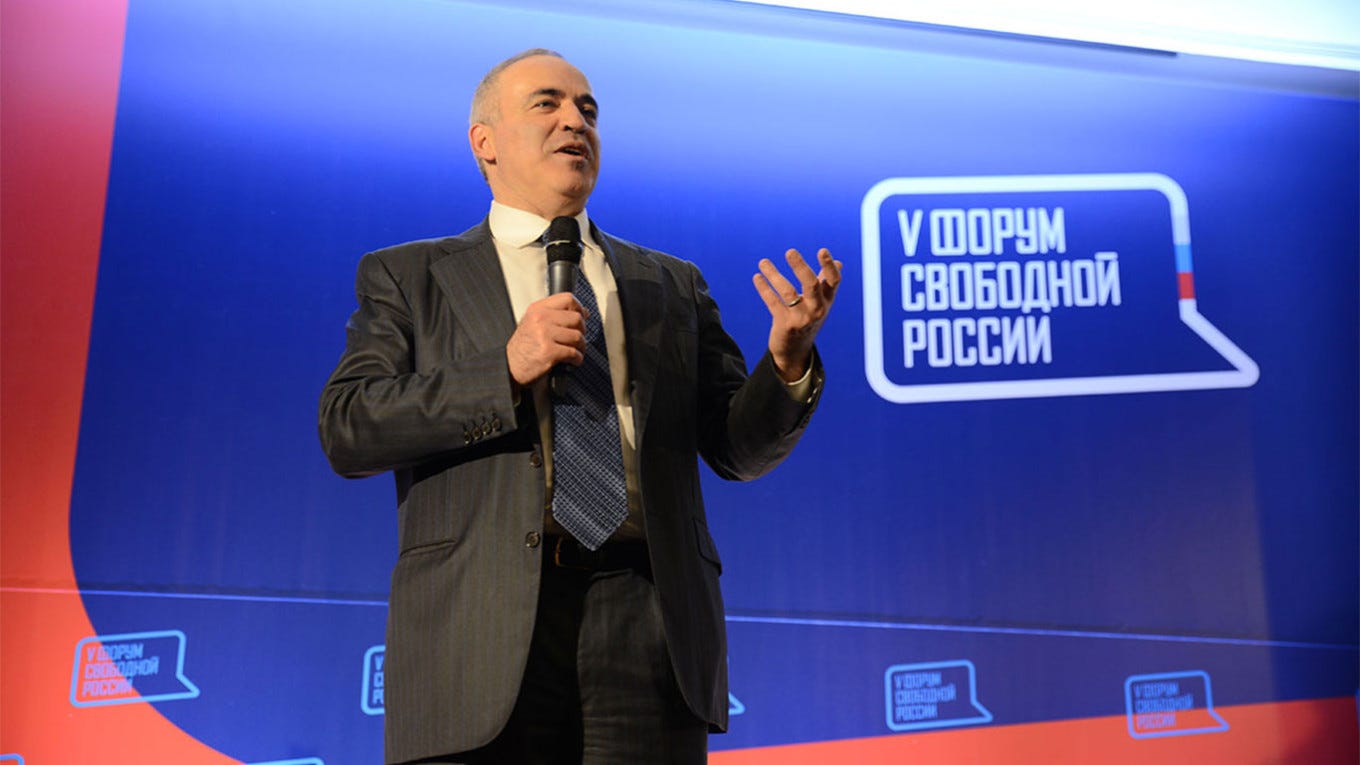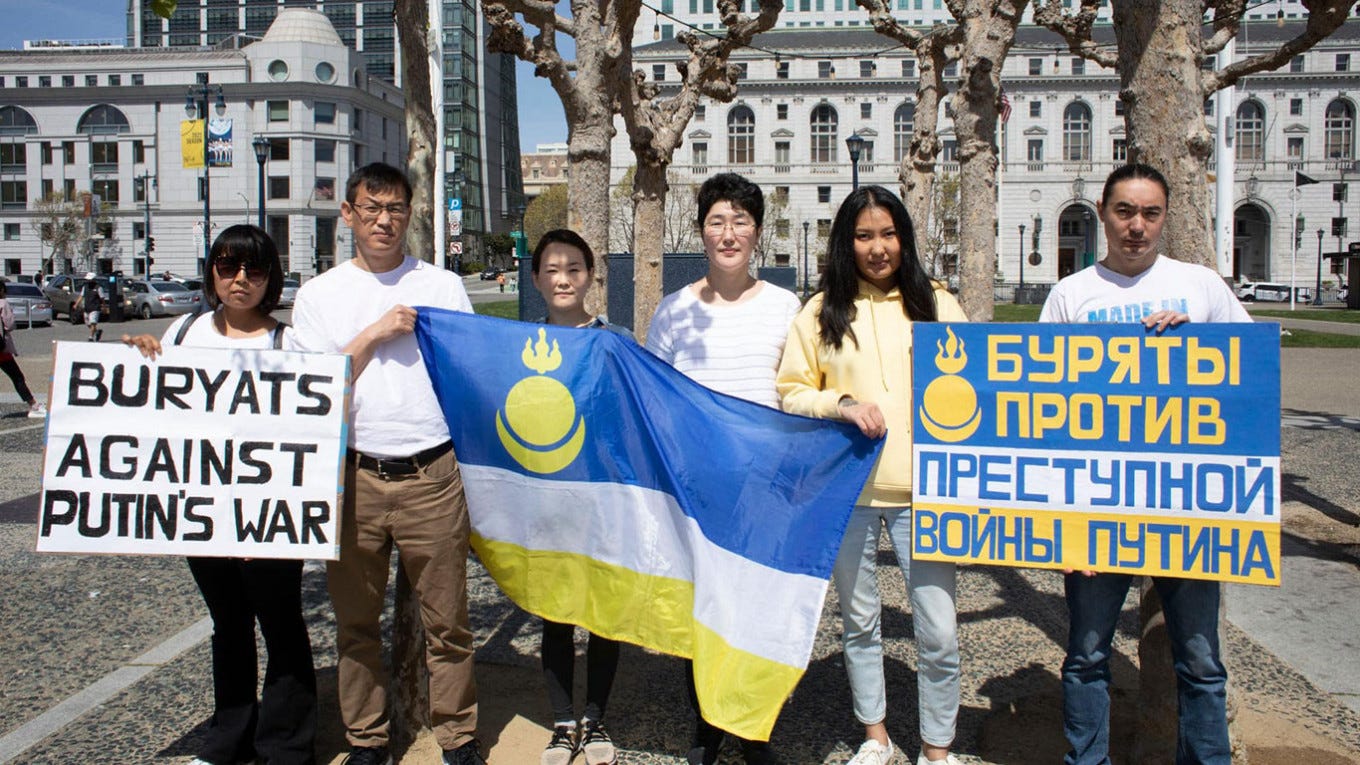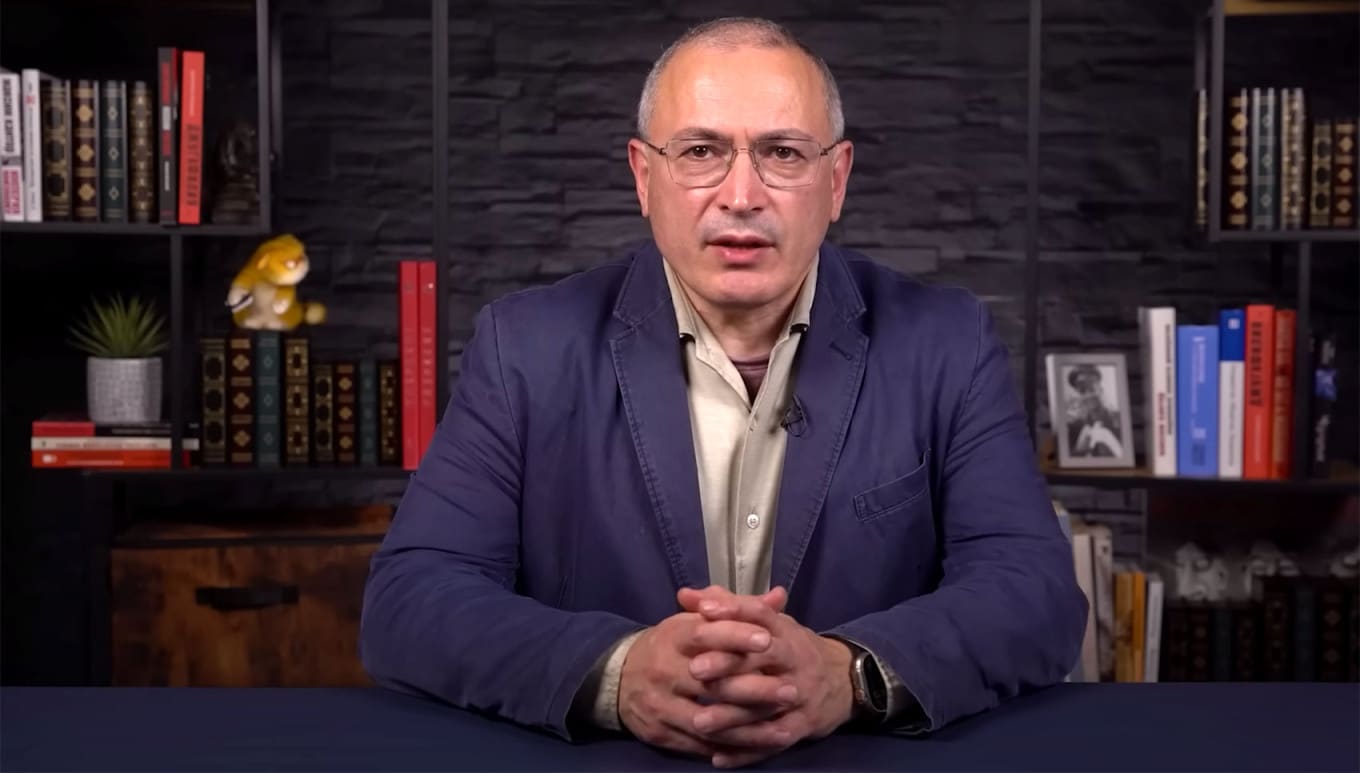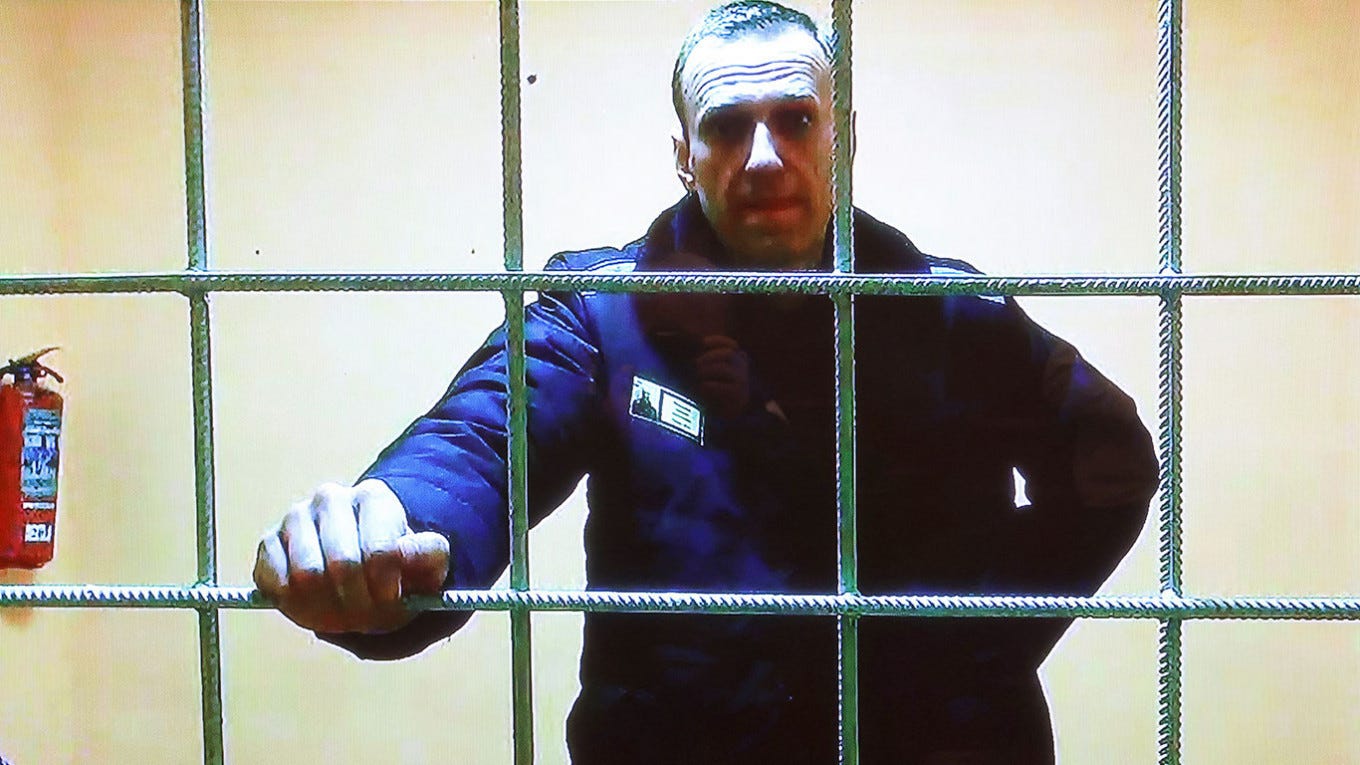Belgorod news & a brief guide to some dissent groups in Russia
Who's behind the attack on Belgorod, Russian dissidents, and article by The Moscow Times published on March 6, 2023
Note before reading…
The "Russian Volunteer Corps" and the "Freedom of Russia" Legion are conducting an operation to "liberate the territories of the Belgorod region from the so-called Putin regime and push the enemy back in order to create a security zone to protect the civilian population of Ukraine." According to Ukraine's Military Intelligence Service, the operation is being carried out exclusively by Russian citizens.
Who are they?
The "Freedom of Russia" Legion is a military unit formed in March 2022 by the former servicemen of the Russian Federation and ethnic Russians. The "Russian Volunteer Corps" is consist of former POWs who decided to shift sides.
The Russian Volunteer Corps, reports War Takes, “is pretty unabashedly right-wing and was founded by a neo-Nazi football hooligan and MMA organizer Denis Kapustin (AKA Denis Nikitin). They claim to be part of the Ukrainian military, but the Ukrainian military seems to keep them at arms length”. The Washington Post reported on the leader of the RVC back in March 2023:
Kapustin is a former mixed martial arts fighter and a far-right radical who calls himself Denis “WhiteRex” Nikitin and built a white nationalist mixed martial arts empire spanning from Britain to Eastern Europe. The Anti-Defamation League describes him as a “neo-Nazi” who lived in Germany for many years.
Kapustin described himself as a “Russian nationalist all my life” during a YouTube interview in November with London-based Russian journalist Oleg Kashin. Kapustin said that the Volunteer Corps consists of ethnic Russians fighting on Ukraine’s side, adding that Russian nationalism “has turned completely the wrong way.”
The Freedom of Russia Legion (AKA Free Russia Legion, Liberty of Russia Legion, etc.) does not seem to be explicitly right wing and (on paper) is dedicated more to individual rights and freedoms in Russia. They're supposedly actually part of Ukraine's International Legions.
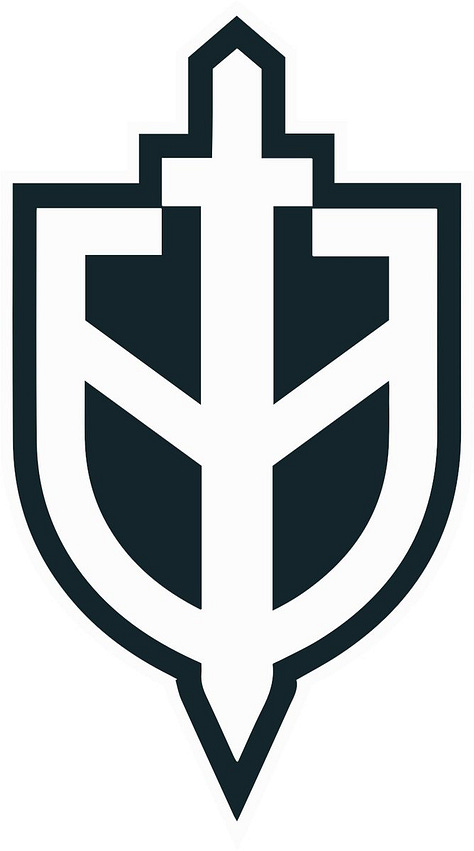
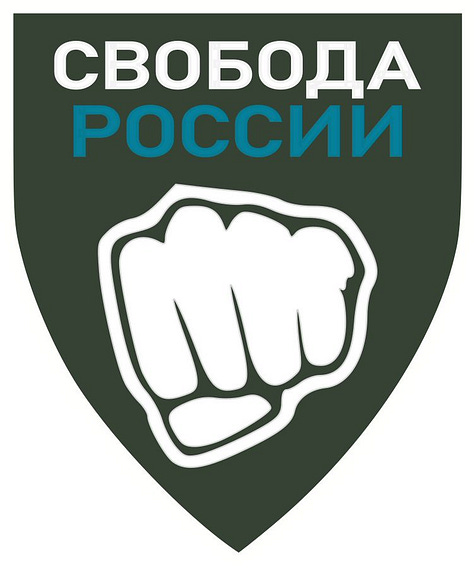

Both the RVC and the Legion are ostensibly allied with one another (as well as a supposed partisan group on Russian soil known as the National Republican Army) via a joint declaration in opposition to Putin's regime known as the Irpin Declaration that was made last August.
The Russian opposition forces allied under the Irpin Declaration supposedly all use the white/blue/white flag that has come to be associated with the anti-Putin movement in Russia - but I have only really seen that associated mainly with the Legion so far, less so the RVC.
Ukrainian intelligence claims that only “opposition-minded Russian citizens who are ready for an armed struggle against Putin’s criminal regime” are participating in the raid in the Belgorod region. Andrey Yusov, a spokesman for the Main Intelligence Directorate of Ukraine’s Defense Ministry, referring to the RVC said the group is independent and that “they are citizens of the Russian Federation, who have the right to defend, liberate their territory from a tyrant and dictator.”
What happened?
Russian security forces evidently clashed with resistance forces in at least three areas in Belgorod Oblast between 19 and 22 May 2023.
Vyacheslav Gladkov, governor of the Belgorod region in Russia, has issued an update on the situation there via Telegram. He claims that numerous settlements have been under “mortar and artillery fire”, writing:
MLRS worked on residential buildings and civilians, explosive devices were dropped from quadrocopters. As a result, there are 12 injured civilians, damage was recorded in 29 private houses and three cars. There is currently no electricity in 14 settlements, we will start restoration work when the operational situation allows.
"The most serious incident took place near the town of Grayvoran. As well as small-arms fire fights, there was an uptick in drone or indirect fire attacks near the incidents. Russia has evacuated several villages and has deployed extra security forces to the area," UK Ministry of Defence said.
Russian state media reported that the 'majority' of residents fled Belgorod Oblast villages along border. Vyacheslav Gladkov, the governor of Russia's Belgorod Oblast, told Russian state news agency RIA Novosti on May 22 that the "majority" of residents in the border villages of Russia's Belgorod Oblast, including the town of Grayvoron, have fled.
In the early afternoon on May 22, the Russian information space experienced "panic, factionalism, and incoherency", as observed by the Institute for the Study of War. UK Defence Intelligence believes Russia will use the latest incidents on its border to promote its official narrative of being a "victim of war". Steve Rosenberg, BBC News in Moscow, tells us what the Russian papers were saying on May 23 about the Belgorod attack.
As of May 23, the Legion "Freedom of Russia" and the Russian Volunteer Corps have begun to dig in in the Belgorod region. It seems that there is still a lot of confusion on behalf of the Russian authorities. Putin and Shoigu have yet to make a statement about the attack, although the Governor of the Belgorod region, Vyacheslav Gladkov, says authorities still don’t control the situation and urged residents not to return to the area.
In the morning defence briefing, Moscow claims to have pushed back the fighters it says launched a crossborder attack from Ukraine to the Belgorod region, Reuters reports, noting that the claim could not immediately be independently verified. Russia’s defence ministry claims remnants of the units it blamed for the attack have now been forced back into Ukrainian territory. In its daily briefing, the ministry has said more than 70 attackers were killed.
What is their aim?
Their goal is to defend Ukraine from the illegal and unjust war of aggression, defeat Putin's regime, and re-establish the Russian Federation as a democratic state. "Unarmed opposition in Russia isn't opposition at all," the Chief of Ukraine's Military Intelligence commented on the political aspect of the regiments' actions.
The regiments appeared in Belgorod and Bryansk regions, reportedly seizing a few villages. They were likely heading toward the regional capital. The Moscow regime has launched a "counter-terrorist operation." So far, there have been reports of eight injuries and the downing of a helicopter, according to social media sources.
Are they legit?
Beyond the information available through media channels, and the statements released by the leaders of the attacks, it’s difficult to assess if they are a legitimate expression of resistance and dissent or part of a larger operation. They were certainly well-organised.
They may be part of the staging activities for the Ukrainian counteroffensive, or they may be part of a Russian operation used to discredit Ukraine and amplify the narrative of the ‘victim’ that Russia as noted by UK Defence Intelligence. Denis Kasputin, leader of the Russian Volunteer Corp, has a background on the far-right: Russian media pounced on the ‘nazis for Ukraine’ narrative immediately after the first videos emerged on May 22.
Increased sabotage events in Russia
In addition to targeting command and control centers and ammunition depots in the occupied territories, there has been an increase in sabotage actions within the territory of the Russian Federation.
Radical elements in Russia, including heavily censured political TV shows, are discussing the possibility of a civil war, which Russia's unsuccessful invasions have been historically bringing home.
If authentic and organic, the regiments' actions could potentially set off a chain of events leading to such a situation in the foreground of the growing understanding that Putin is the incapable leader who caused the country's strategic defeat.
Yuriy Sak, an adviser to Ukraine’s minister of defence, has been speaking to Times Radio in the UK, and has said Ukraine is confident that the incident in Belgorod will not be the last time insurrection is seen within Russian borders. He told listeners:
It is quite surprising to us that it has taken so long for Russian insurgents and Russian partisans to become more active in terms of trying to get rid of the terrorist regime which is inflicting death and destruction on Ukraine, which is isolating Russia internationally. Over 200,000 Russian soldiers have been killed. Apparently the breaking point has been reached.
Why is it happening now? Because Ukrainian armed forces have exposed that Russia is a paper tiger. We have exposed that Russia can and should be beaten on the battlefield. This is what we are doing in Ukraine.
And we are confident that this has encouraged Russian partisans and those Russian citizens who hope to change something, and don’t want to be part of this crime of aggression.
Russians who don’t want to be associated with this terrorism. Who don’t want their children to, you know, live with this eternal shame and disgrace because of what a group of people in the Kremlin are doing to Ukraine and the world.
Sak distanced Ukraine from direct involvement with the partisans, but said they shared similar aims:
I think the objective of those activities has been articulated yesterday by the people who have committed them. They have said they want to demilitarise that part of Russia. They want the war to go away from their territory.
And this is in line actually with our objectives. Because we believe that for Ukraine to be safe and for Europe to be safe, after we defeat Russia on the battlefield we will need to all establish a demilitarised zone of some form in parts of Russia.
Bruno Kahl, Head of Germany's Foreign Intelligence Service, says disputes in Russian society do not pose a threat to Vladimir Putin's government, as reported by DW. "We see no cracks in the Putin system," he said.
According to him, public criticism of the war against Ukraine is a common disagreement in Russia, and not a threat to the regime. "Russia is still capable of waging a long-range war," he said, pointing to newly recruited soldiers. However, Kahl said that Russia had certain vulnerabilities, including the performance of the armed forces.
Official statements
The representative of "Freedom for Russia Legion", callsign "Caesar", said on May 23 that Belgorod residents requested the Legion to conduct a peacekeeping operation in the region.
On May 22, the "Alliance of Indigenous peoples" - an organization whose goal is the dismantling of Russia and the revival of nation-states in their original territories (as per their own description), published a video calling the people of "Chuvashia, Belgorod region, Voronezh and Novgorod republics, Karelia" to "vote for independence on an upcoming referendum".
A Beginner's Guide to Russia's Fragmented Opposition
The Moscow Times, March 6, 2023
The political repression driven by the invasion of Ukraine has drastically altered the landscape of Russia’s disparate opposition.
To make sense of the fractured Russian opposition a year into the war, The Moscow Times has compiled a list of the largest and most notable movements — both inside the country and among the Russian diaspora — abroad - advocating for a future without Russian President Vladimir Putin.
[NB: Opposing Putin’s leadership does not automatically mean that these groups oppose Russian imperialism or a continuation of the current authoritarian state. It is also unclear in some cases if these groups are piloted opposition. Besides this, they do not enjoy widespread consensus in Russia—they have very few supporters. Some do enjoy some relevance in the West and have garnered support from Western authorities and leaders.]
The Congress of People’s Deputies
Taking its name from the last Soviet parliament, the Congress of People’s Deputies of Russia aims to create a body of former Russian lawmakers in exile, which, the organizers claim, will be prepared to assume the role of a transitional government in the event of Putin’s removal from power.
Leaders of the initiative, including former State Duma deputies Ilya Ponomarev and Gennady Gudkov and lawyers Mark Feygin and Yelena Lukianova, stake their claim to legitimacy as leaders of the opposition based on having won Russian elections at various levels in the past.
The Congress’s first session, a three-day event that took place in Poland in November 2022, was marred by factional rivalries and saw several potential members withdraw from the coalition citing concerns about its legitimacy in the eyes of the Russian public.
Feminist Anti-War Resistance
Founded by feminist activists Daria Serenko and Ella Rosman just hours after the invasion of Ukraine began, Feminist Anti-War Resistance (FAR) swiftly became a leading force behind protests against the war both within Russia and abroad.
“We are the resistance to the war, to patriarchy, to authoritarianism and militarism. We are the future and we will win,” reads FAR’s manifesto, which was published on Feb. 25 last year.
The organization’s decentralized, horizontal structure, which allows virtually anyone who shares its values to participate in its activities and use its symbols, has ensured the swift spread of FAR “cells” across Russia’s regions as well as in over 20 other countries.
With the safety of its activists in mind, FAR uses an array of non-violent protest methods that go far beyond traditional demonstrations and single-person pickets. FAR activists have written anti-war slogans on banknotes circulating within Russia, installed anti-war art in public spaces across the country and have even handed out flowers on the streets to get their message across.
Another atypical form of protest that sets the group apart is its use of flashmobs, including one in the Moscow metro where members held public crying sessions to protest the war. The organization also produces “Female Truth,” an anti-war newspaper that is published online and distributed in print by FAR activists across Russia.
The Free Nations League
Established in May, the Free Nations League is a platform uniting pro-sovereignty movements and individual activists representing the indigenous peoples of Russia, including Bashkirs, Buryats, Chechens, Erzya and Tatars.
Highlighting the colonial undertones of Russia’s invasion of Ukraine, The Free Nations League positions itself as an “anti-imperialist movement” that seeks independence for Russia’s ethnic republics.
Members of the League have been spotted attending the Free Nations of Post-Russia Forum, which aims to foster discussion and create a plan for the dissolution of the Russian Federation in its present form.
The gathering, which is also linked to Ponomarev of the Congress of People’s Deputies, was criticized both by pro-Kremlin forces and other segments of the opposition, both of which questioned its legitimacy.
The Free Russia Forum
Established in 2016 by chess-grandmaster-turned-political-activist Garry Kasparov and opposition politician Ivan Tutrin, The Free Russia Forum (FRF) works to unite an array of Russia’s opposition-minded activists and “create intellectual alternatives to Putin’s regime.”
Based in Lithuania, FRF has convened 11 times since its founding and has held three anti-war conferences in Vilnius since the start of the invasion.
The Russian authorities added the platform to its list of “undesirable” organizations in February, saying it posed “a threat to the constitutional order and security of the Russian Federation.” Though Russian law requires organizations labeled as “undesirable” to disband, FRF has said the platform did not “intend to stop its activities, including those on Russian territory.”
Indigenous Anti-War Movements
There is mounting evidence that the war in Ukraine has seen a disproportionate share of deaths on the Russian side being borne by soldiers from the country’s minority ethnic communities, many of which are already blighted by poverty and have long been subject to official discrimination.
This has paved the way for the creation of an array of anti-war movements representing non-Slavic indigenous peoples of Russia such as the Free Buryatia Foundation, Free Yakutia Foundation, Free Kalmykia Foundation and Bashkortostan’s Akbuzat movement.
Facilitated by the work of volunteers — most of whom are members of the diaspora living outside of Russia — the various movements concentrate on helping conscientious objectors and anyone attempting to flee conscription, combatting Kremlin propaganda and raising awareness of the systemic discrimination.
Team Khodorkovsky
Oil tycoon Mikhail Khodorkovsky entered Russia’s political landscape in 2001 with the launch of Open Russia Foundation, which then worked to “strengthen civil society in Russia.” His decade-long imprisonment on embezzlement charges stifled his political activities, but following his release in 2013 the erstwhile richest man in Russia re-launched the foundation from London where he remains in exile.
The Open Russia Foundation was forced to disband in 2021 after being labeled “undesirable” by the Russian authorities.
But Khodorkovsky, who voiced his ambition to become the next Russian president, has retained a high profile in the media due mainly to his YouTube channel — which boasts over 1 million subscribers — where he posts commentary on current events, and the YouTube news project Open Media.
Team Navalny
While Navalny remains the best-known Russian opposition politician outside Russia, he and his Anti-Corruption Foundation have been less successful at dominating the political agenda since Navalny was imprisoned and his political network blacklisted as a “terrorist organization” by the Kremlin in 2021.
Most of Navalny’s closest allies have now left Russia for fear of arrest, but they have worked hard to continue their movement’s work from abroad in the wake of Russia’s invasion of Ukraine.
Days after the start of the war, Navalny’s team launched the YouTube-based media project Popular Politics. With over 1.7 million subscribers, the project has allowed Navalny’s key allies to maintain a high profile in the Russia mediascape, including his right-hand-man Leonid Volkov and lawyer Lyubov Sobol.
In October, Navalny’s team pledged to relaunch its in-country political network, which at one point had 50 regional headquarters, “to fight mobilization and war.” In January, the group launched the “Free Navalny” campaign, an attempt to coordinate global efforts to free the Kremlin’s chief nemesis.
The Russian Anti-War Committee
The Russian Anti-War Committee was created by some of the most prominent exiled members of Russia’s liberal opposition, including former oil tycoon Mikhail Khodorkovksy, chess grandmaster and political activist Garry Kasparov, jailed Kremlin critic Vladimir Kara-Murza and businessmen Boris Zimin and Yevgeny Chichvarkin.
The Anti-War Committee’s initiatives include a group set up to provide humanitarian assistance to Ukraine and the Kovcheg Foundation, which assists recent Russian emigres with resettlement.
The Anti-War Committee’s best-known side project is the Russian Action Committee, which aims to provide “every progressive Russian” with a platform for declaring their anti-war stance.
At its first gathering in Lithuania last year, leaders of the Action Committee proposed creating a legal mechanism that would allow Russian citizens with anti-war positions to bypass Western sanctions. The proposal was quickly dubbed “the good Russian passport” and suffered widespread ridicule.

